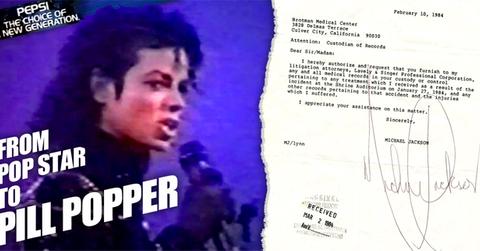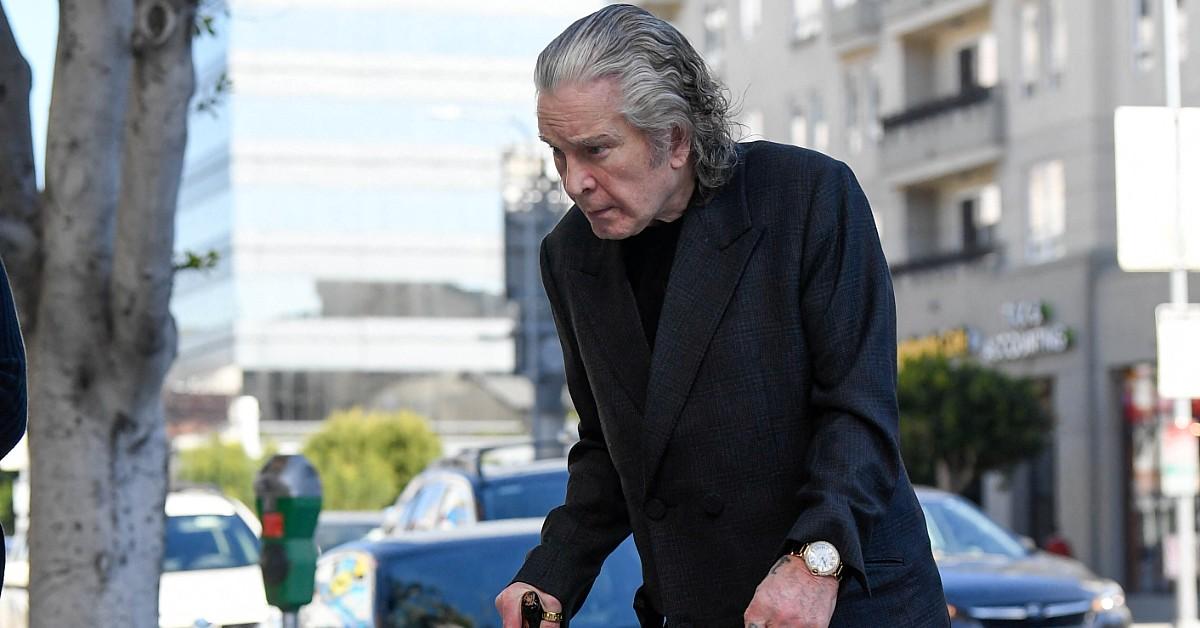Never-Before-Seen Medical Records Reveal How Pepsi Fire Started Michael Jackson On The Road To Addiction

Oct. 21 2013, Published 5:55 p.m. ET
In 1984, Michael Jackson was at the top of the entertainment world, fully enshrined on his throne as the King of Pop. But on January 27, his life would change forever.
A freak accident on the set of a Pepsi commercial left Jackson with severe burns on his scalp after his hair caught fire -- an incident that sent him off on a downward spiral of chronic pain and prescription narcotic abuse.
EXCLUSIVE DOCUMENTS: Never-Before-Seen Michael Jackson Medical Records
Now, for the first time, RadarOnline.com can tell the untold story of that fateful incident through explosive never-before-seen medical documents that shed new light on the moment when the "Thriller" star started to become a tortured drug addict.
Jackson "was known to be a well-developed, well-nourished male," before the accident, Dr. Steven Hoefflin wrote in the documents on January 27, 1984, the day it occurred.
Those documents are now being auctioned via Nashville-based auction house Flatsigned and have been provided to RadarOnline.com.
They reveal that at approximately 6:15 p.m. that night, during a commercial shoot at L.A.'s Shrine Auditorium, "a timing error occurred and a pyrotechnic device exploded behind his head. His hair caught fire and he was smothered by his brothers and stage crew and the fire put out."
Initially transferred to Cedars-Sinai Medical Center, Jackson "was noted to be quite shaken up with palm-sized area of 2nd and small area of 3rd degree burn," Hoefflin added. There was also a "central 25-to-50 cent piece area of deeper burn."
He was provided the powerful opiate narcotic Darvocet, which has since been pulled from the U.S. market after the FDA cited health risks.
(Prior to that time, the pop star had only been prescribed lupus and rheumatoid arthritis drugs Plaquenil and Atabrine, the records claimed, as Jackson had recently been diagnosed with discoid lupus erythematosus.)
After taking the Darvocet, he was "less anxious and fearful from the incident," Hoefflin revealed.
Jackson was then "put to bed rest with intermittent bathroom privileges," as doctors applied analgesics to his scalp and fed him a steady diet of painkillers: Percocet or Darvocet every three hours. At night, he was given the powerful sedative Dalvane to help him sleep.
Doctors consulted "his treating dermatologist, Dr. Arnold Klein," who revealed that Jackson's recent lupus diagnosis had been accompanied by scalp flakiness and increased susceptibility to scalp infections, the records revealed.
As such, Klein suggested Jackson be placed on antibiotics.
The next morning, January 28, "he was examined and noted to be quite sleepy," the report said. And although doctors recommended he stay in the hospital, Jackson insisted he would rather recuperate at home.
Finding the burn to be much improved and rather small, the doctors agreed.
"It was felt that in view of the outpatient size of the burn, his desire to rest more comfortably in his home surroundings … that he be discharged and followed closely on outpatient basis," it's said in the records.
Doctors prescribed him Percocet or Darvocet, to be taken every three hours -- and he was released from the hospital "in good spirits."
Little did anyone know that from that moment on, Jackson would begin a downward spiral into a full-fledged painkiller addiction that would eventually kill him.
Progressed to taking the surgery anesthetic, Propofol, merely to sleep, he died of an overdose of the narcotic on June 25, 2009 -- just over 15 years after the disastrous Pepsi commercial accident.

The documents have come into the public domain after ambulance driver, Brian McDaniel, allegedly found them discarded in a bin in a park in Culver City, which is only a few miles from where Jackson was treated at the Brotman Medical Center.
The full eight-page document with seven images of his scalp have never been seen before -- and have been censored by RadarOnline.com due to their graphic nature.
The Michael Jackson Estate -- which is partly-owned by his children Prince, 16, Paris, 15, and Blanket, 11 -- is said to be locked in a battle with Pepsi and Lady Gaga, an avid MJ memorabilia collector, who are all desperate to get hold of the original records.



